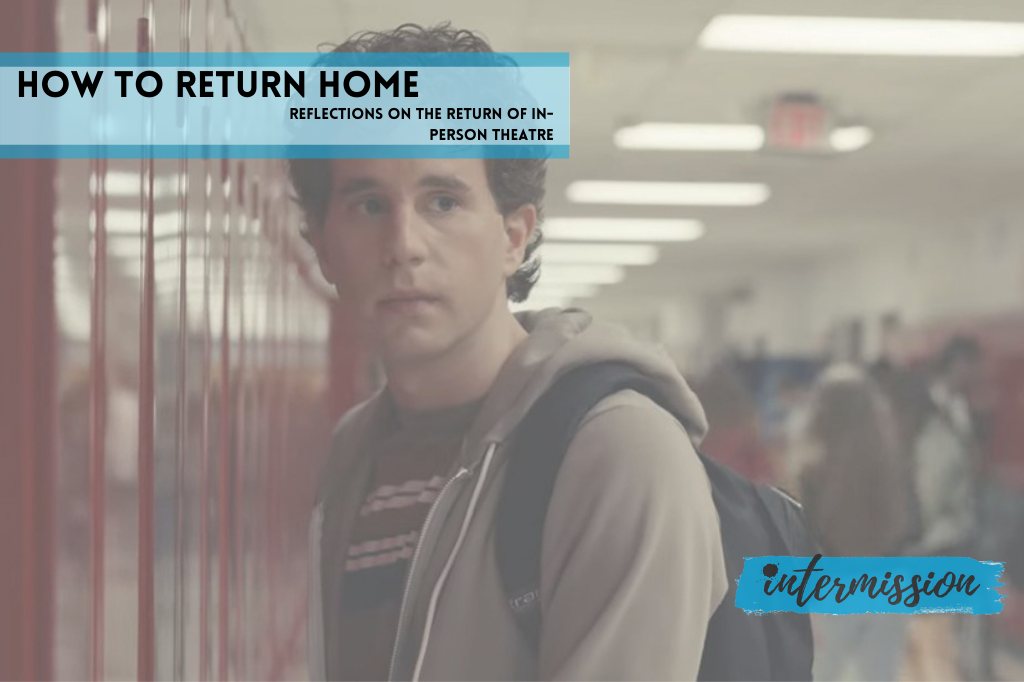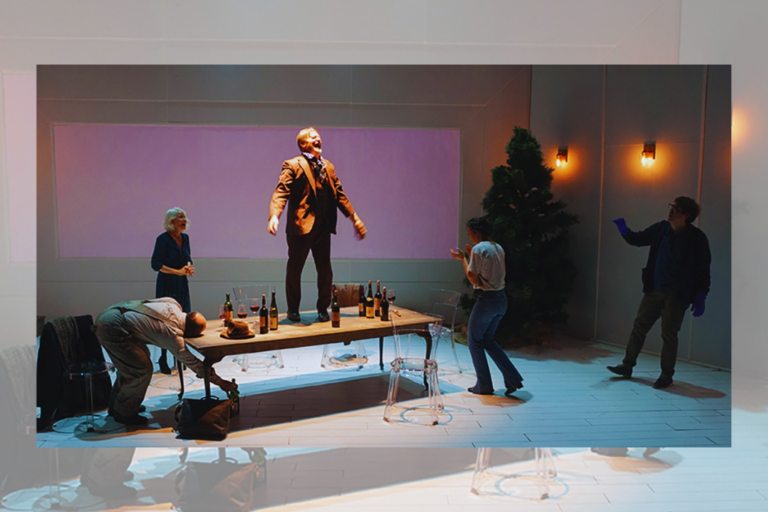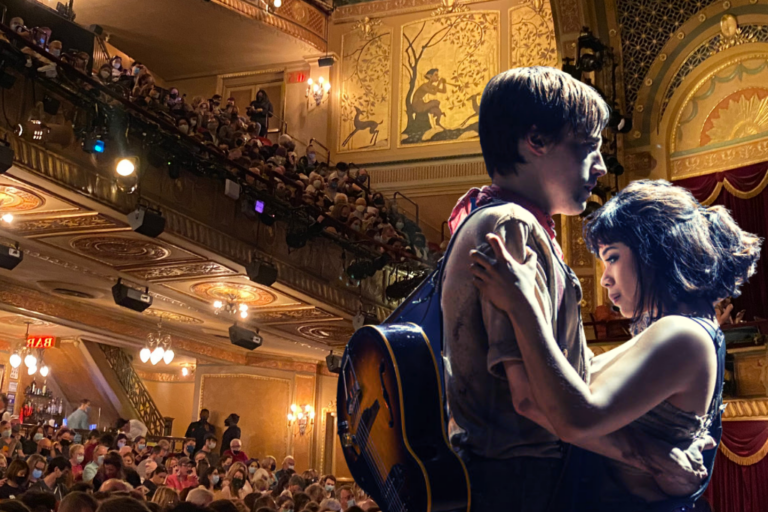How to Return Home: Dear Evan Hansen at TIFF
As in-person Toronto theatre slowly re-opens, Intermission’s Editors will be sharing personal reflections on the realities of being back in the theatre. These are not criticisms or reviews. They are not blog posts. They are memories of being caught in the middle of a theatre renaissance. They are an archive. They are history.
I’m freshly nineteen, ascending the steps of the Music Box Theatre in New York City. I’m comfortable in a cherry-red dress, ripped tights, and near-destroyed combat boots. There are strangers close enough to smell. My best friend sits to my right, buzzing with nerves and excitement, same as me, same as everyone.
I’m freshly nineteen, home in the United States after a tumultuous first year in Canada. I’m depressed and at the mercy of my smartphone. I miss high school. I don’t miss high school. I do and do not. Caught.
Lights down, curtain up, Ben Platt, piano, angst, tears, more tears, curtain down. Ovation.
I’m freshly nineteen. I’ve been witnessed. I’ve been found. Dear Evan Hansen has eaten away at my edges and burrowed itself into my nineteen-year-old soul — its protagonist might be a monster, but its music, its message, its craft — they’ve re-instilled in me a long-latent reverence for theatre, for liveness, for community. In my adolescent mind, Dear Evan Hansen is my church, Ben Platt’s vibrato its gospel.
Nothing will ever top this, nothing will ever lessen it, never again will I wonder how the world might look from up so high.
The next day, at home in Baltimore, I get a tattoo, a visible tattoo, a tribute to the show that’s reminded me of the power of the staged image. I get a Dear Evan Hansen tattoo. It’ll be on my arm forever. It’ll be readable forever. I’ll never regret it, never cringe, never shy away from the material it quotes.
I’ll never grow up, and Dear Evan Hansen will always be perfect.

I’m twenty-three and overdressed.
It’s not New York, but Toronto.
I haven’t paid through the nose for tickets this time — I’m seeing it for free, I excitedly tell nineteen-year-old me. We’re seeing it for free! We’re in the same room as Ben Platt again! We get to revisit Dear Evan Hansen! It’s happening! It’s real!
Never mind that the promotion for this film has been nearly non-existent for what will become obvious reasons. Never mind that every tweet about this film has been about one thing and one thing only: Platt’s age. Never mind that the filmmakers have allegedly cut some of the show’s most poignant moments in the adaptation from stage to screen. Never mind. Never mind. Never mind.
We settle into our seats, Jessica and I. We make snide jokes under our breath. Someone farts a few rows behind us — oh, to be back in the theatre, even if for a movie instead of a play.
The film starts.
My heart breaks.
The anxious teen Dear Evan Hansen saved in 2017 has grown into a critical, storied adult. Dear Evan Hansen no longer feels like a miracle of ensemble theatre, but instead like a vanity project for the Platt family. Multiple indulgent allusions to The Perks of Being a Wallflower, a gorgeous film that, of course, just happens to be by the same director as Dear Evan Hansen, don’t so much catch my eye as they do stick thumb tacks into it, damaging whatever reverie I had left for this story, this music. These references feel cheap, an inside joke I understand but don’t find funny.
I wanted so badly to love it.
I wanted so badly to love it.
The film is two and a half hours of not-quite-naturalism punctuated by oddly presentational singing. The Murphy family seem to have understood the assignment — Danny Pino as Larry, Amy Adams as Cynthia, Kaitlyn Dever as Zoë, and especially Colton Ryan as Connor abound with nuance — emotional layers well suited to the silver screen. In Ryan especially I see the shreds of earnest that made Dear Evan Hansen so special on Broadway — I cannot help but wish he’d been given the chance to play Hansen here.
I do not care that Ben Platt looks too old to believably play a high schooler. I do not care about the evident nepotism involved in making this film a reality. I do not care that this film was, allegedly, a means of preserving Platt’s Tony-winning performance as Evan forever.
None of that matters.
I care that even with a voice like gold and an evident dedication to the psychology of this character, Platt’s Evan simply does not make sense when filmed in this manner. What made Platt’s Evan so breathtaking on Broadway was its depth, its distance — here, at TIFF, on the largest screen I’ve seen in nearly two years, Platt’s Evan is melodramatic; jerky; misplaced. The voice doesn’t save the performance — it distracts from it, and not enough.
I don’t disagree that Dear Evan Hansen should have been preserved forever — it should have taken notes from Hamilton and, more recently, the excellent Come From Away, and released a pro-shot of the staged production with its original cast. I do not need to add to the digital chorus of voices singing that original production’s praises — it truly was that special, and I absolutely think the industry would have benefitted from its professional archival.
But that’s not what we got.
The theatre industry didn’t need this lightning rod of mediocrity across headlines.
We got a hollow, saccharine feature film, one that makes me pull my sleeve down over my ill-advised tattoo, makes me wonder how this story was the one that not so long ago convinced me to continue on in my theatre degree. Jess and I stiffen in unison at the particularly jarring moments of the movie — we both sigh with relief when the credits finally roll.
In my heart there is anger; sadness; grief for my more naïve self. Because after Dear Evan Hansen, I do not feel as if I’ve been found, as the film’s tagline so bravely promised I would be. I feel instead as if I’ve been left behind to atrophy in the Music Box Theatre some five hundred miles away, a nineteen-year-old ghost in an echoing auditorium.
I feel empty.
In the following days, I read the premiere’s negging reviews with a mix of schadenfreude and true despair — nobody wanted this. The theatre industry, particularly that in Toronto, where the film inexplicably premiered, didn’t need this lightning rod of mediocrity across headlines. I hope good things for Platt, and even for Chbosky — two artists whose work fundamentally influenced the person I am now — but I wonder the repercussions of this film on both of their careers, the aftereffects of a sour project.
I’ve grown up. I like beer now, and I have a cat, and I live in Toronto. I’m not the nineteen-year-old sobbing into a milkshake in the theatre district immediately following the performance — I’m the twenty-three-year-old commiserating with a friend over bruschetta and a Collective Arts sour. I adore the theatre with all of my being.
I grew up.
And, despite ample chance, seemingly endless resources, and the ardent begs of a global theatre community, Dear Evan Hansen never did.















Comments